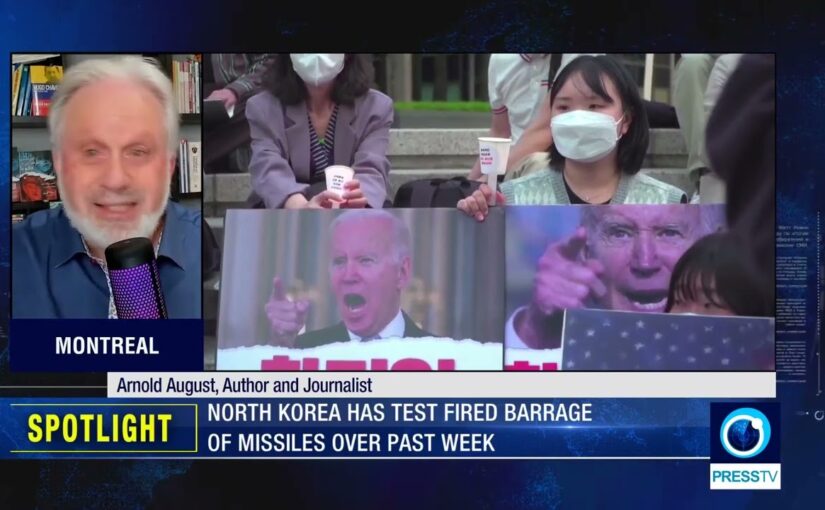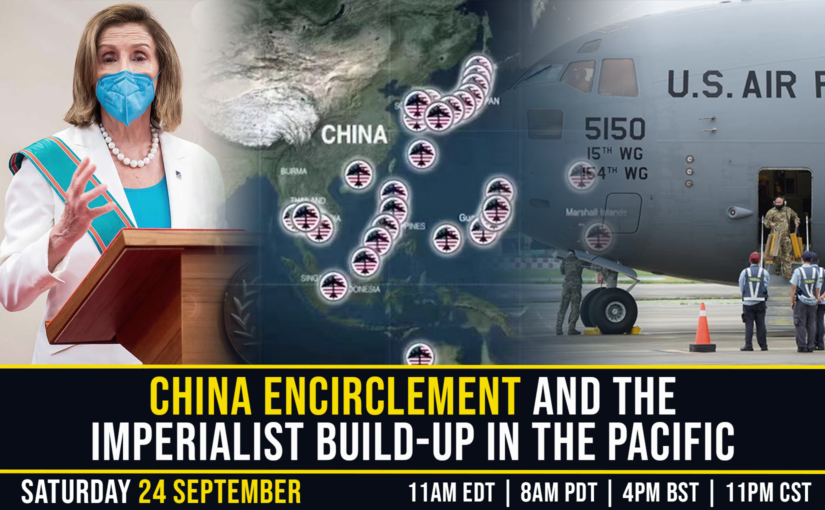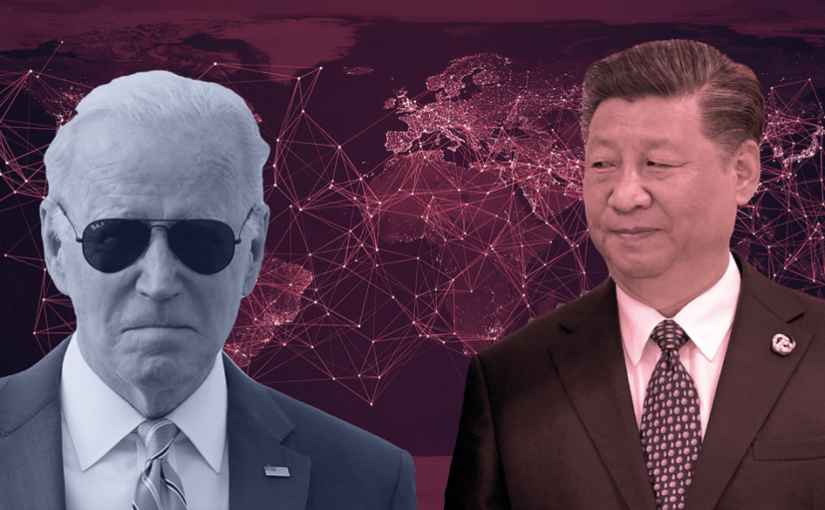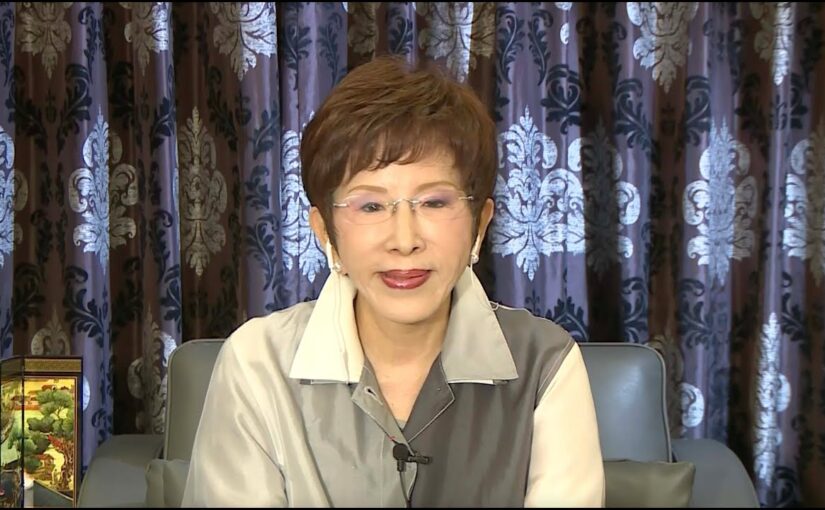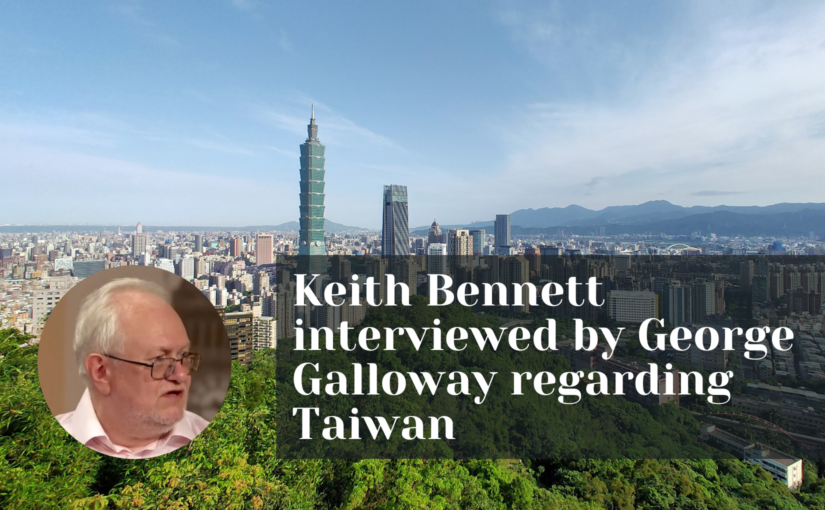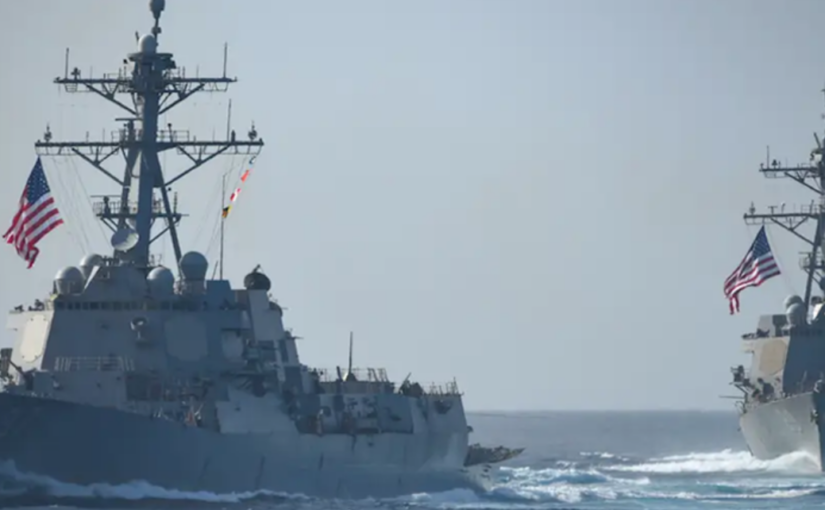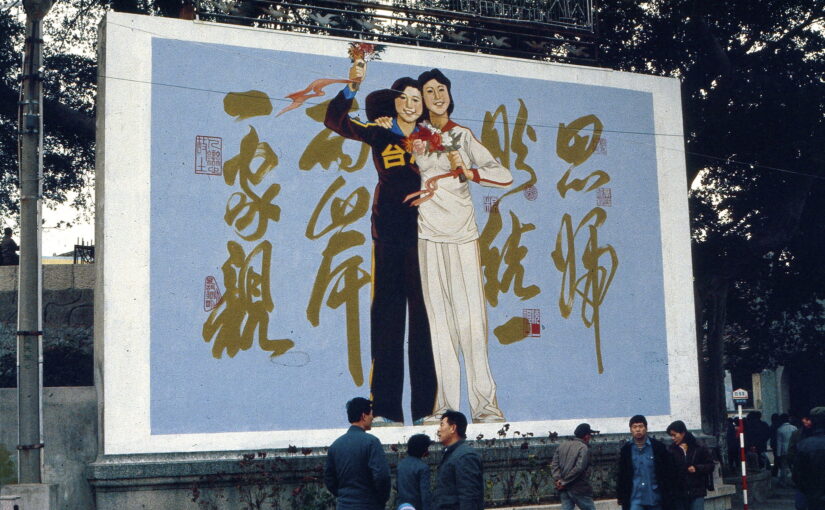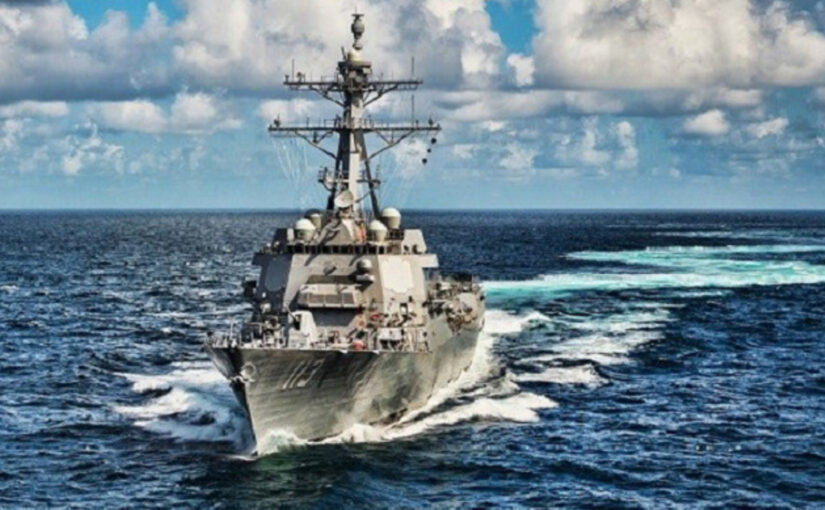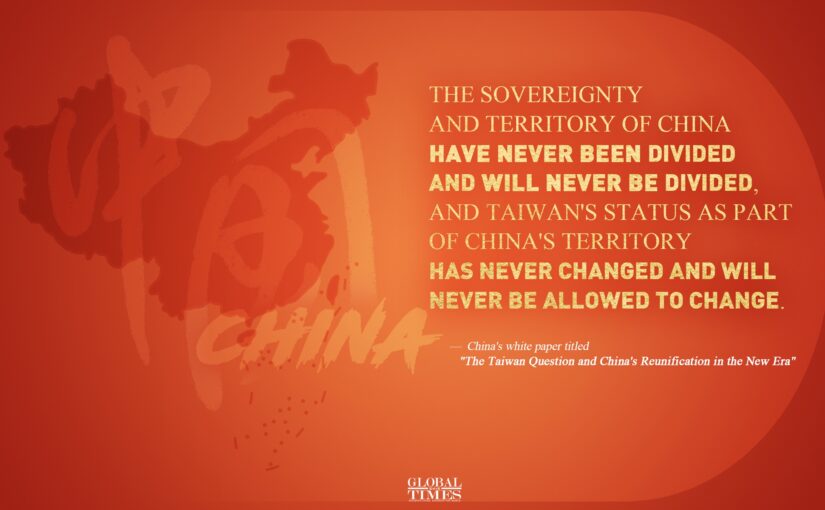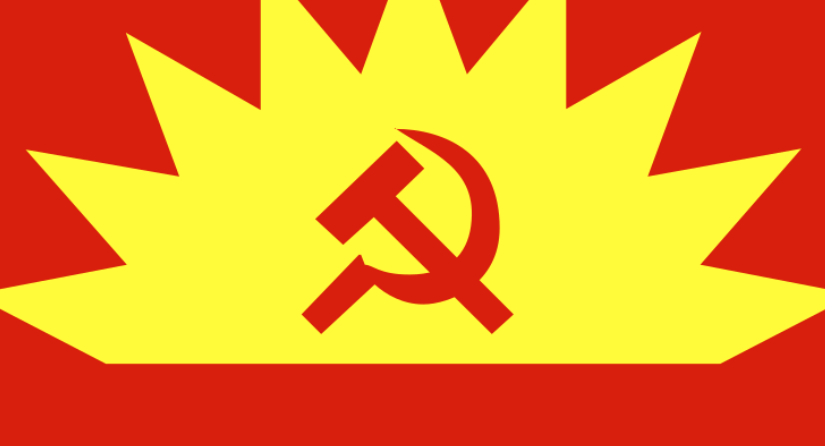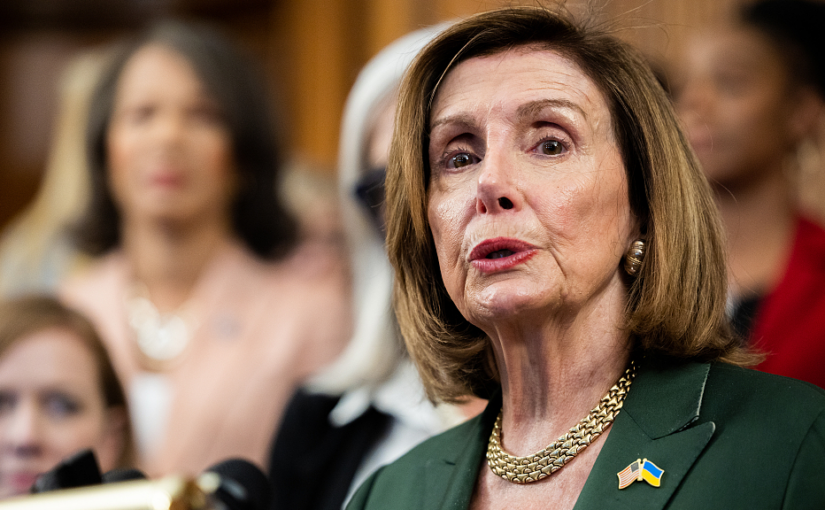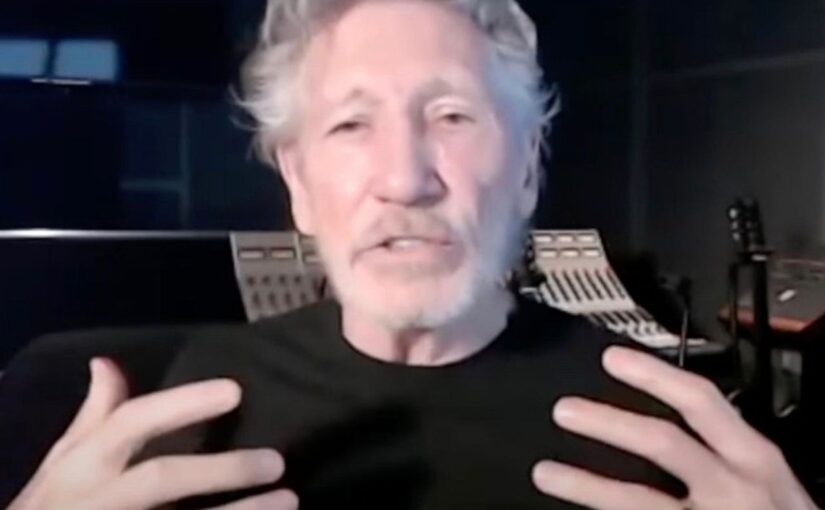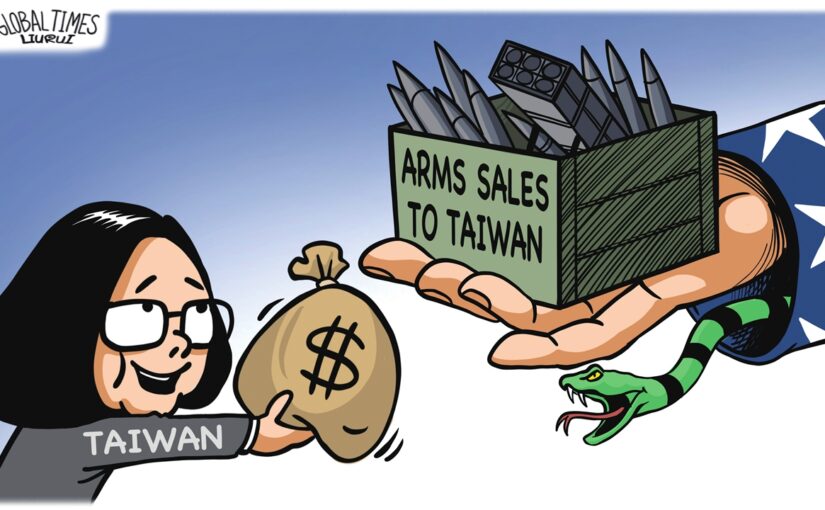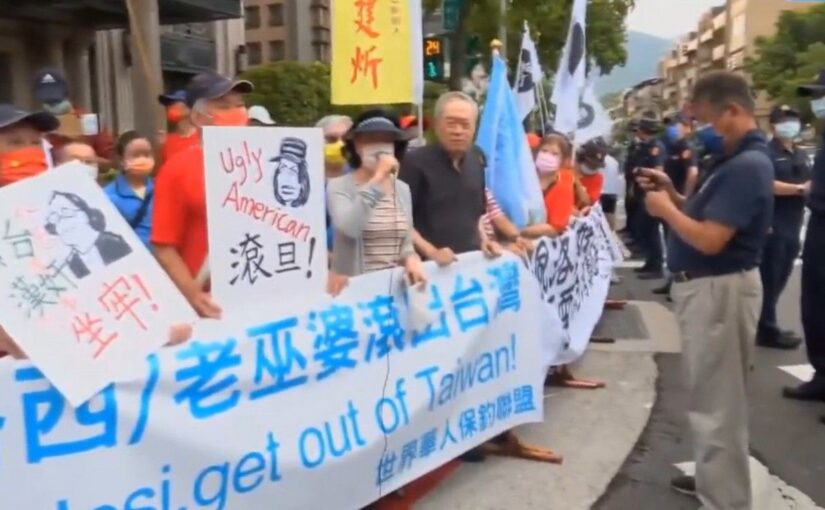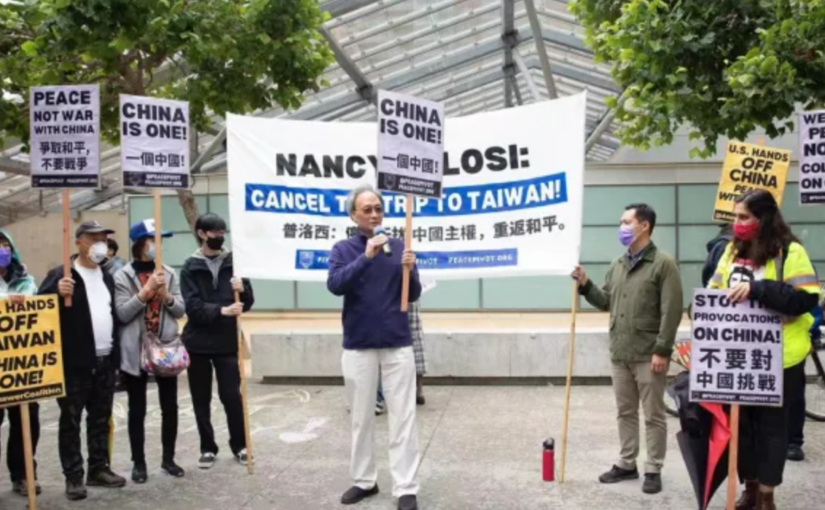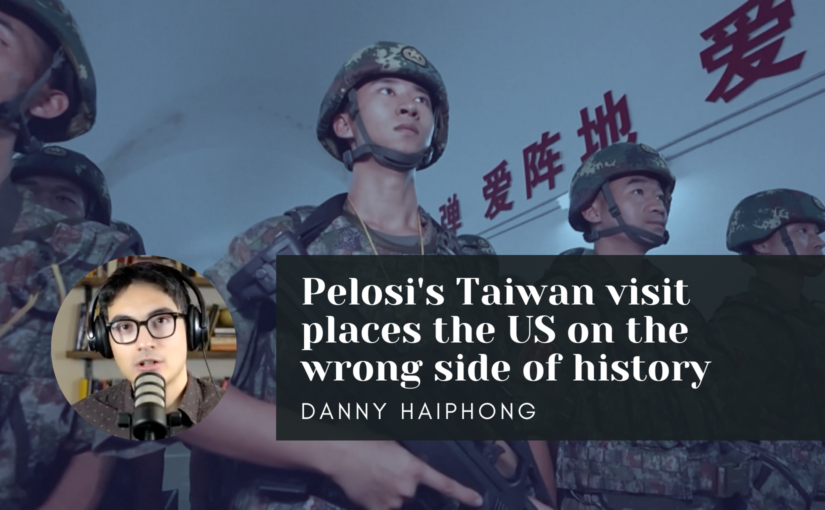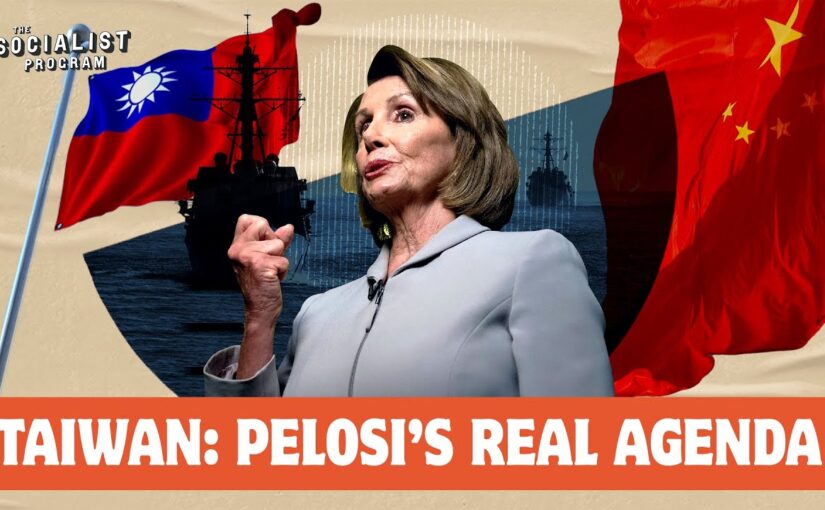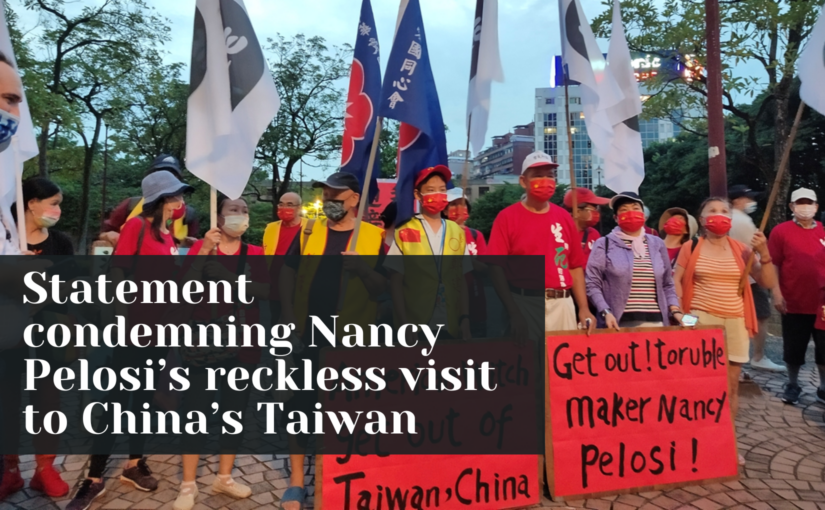We are pleased to reproduce extracts of the November 13, 2022, edition of Press TV’s show Spotlight on the current South China Sea tensions, with Canadian author/journalist Arnold August and Teheran-based anchor/producer Kaveh Taghvai. August focused on China, the BRICS alternative non-US dollar currency as a very significant challenge to US hegemony, and the US vision for leveraging Taiwan against the People’s Republic of China, much as Ukraine is today being used as a pawn in the US/NATO war against the Russian Federation.
Category: Taiwan
Videos: China encirclement and the imperialist build-up in the Pacific
On Saturday 24 September 2022, we hosted a webinar on the rising aggression of the US and its allies in the Pacific region. There were a number of excellent contributions dealing with issues including the Biden administration’s increased support for Taiwanese separatism; Western power projection in the South China Sea and the Taiwan Straits; the hysteria surrounding China’s security agreement with the Solomon Islands; the AUKUS nuclear pact; and developments in Korea and Japan. The event stream and the individual speeches are embedded below, and can be viewed directly on our YouTube channel.
The US gets ready for war in Taiwan
In the following article, first carried in the Morning Star, Kenny Coyle details the “major reversal in US-China relations”, most recently highlighted by Biden’s unequivocal declaration that the US would commit its forces in the event of a military conflict between China and its renegade island province of Taiwan. This, Kenny explains, is “viewed with alarm in Beijing”, as it “increases the possibilities of a US-China war.”
The article outlines the key points of the three Sino-US joint communiques, noting how the second was swiftly undermined by the ‘Taiwan Relations Act’, and drawing attention to the ‘Taiwan Policy Act’, currently making its way through the US legislature. This would allow for an “enduring rotational US military presence” on Taiwan, something that the US has not maintained since 1979 when it established diplomatic relations with the People’s Republic. As Kenny rightly concludes, this “suggests dark days lie ahead.”
On Sunday 18 September, US President Joe Biden told the US news programme 60 Minutes that the US military would go to war in Taiwan should Chinese forces land on the island chain to enforce its sovereignty.
While China has never ruled out the last-resort use of military force, it has always insisted on its preference for peaceful reunification. Biden’s most recent comments repeat previous statements, including one made in Japan, Taiwan’s former colonial occupying power, in May. They are, however, the first since US house speaker Nancy Pelosi’s journey to Taipei in August which resulted in China holding major military exercises after her visit.
Pelosi’s meeting with the political leadership of Taiwan certainly enraged China and inflamed tension in the area. This was no diplomatic faux pas; it was the whole point of her trip.
An official visit by the third most senior politician in the US on a US Air Force special air mission Boeing C40 military jet emblazoned with US livery to a territory in which Washington does not have an embassy or a consulate was a deliberate provocation.
China got the message. Once Pelosi’s jet departed Taiwan’s self-declared air space, rejoined by her US Air Force escort, China announced a series of live-fire military drills around the main island of Taiwan and reaffirmed its declaration of sovereignty over the territories administered by the Taipei authorities.
Continue reading The US gets ready for war in TaiwanLiu Xin interviews former Kuomintang leader
The below video features an extremely interesting and comprehensive interview with Ms. Hung Hsiu-chu, former Chair of the Chinese Kuomintang (KMT) party and current Chair of the Chinese Cyan Geese Peace Education Foundation, conducted by Liu Xin for her popular CGTN programme, The Point.
Speaking from Taipei in the aftermath of the visit by US House Speaker Pelosi, Ms. Hung presents a point of view that is almost never heard in the West – that of a Taiwan-born Chinese patriot. She makes clear that, in the wake of the visit and other western provocations, China will have to move from “fighting independence [of Taiwan] to boosting reunification in an enhanced manner.”
She slams the anti-China statement by the leaders of the G-7 countries and the EU High Representative following China’s response to the Pelosi visit, pointing out that this is simply a US-led bloc, all of whose members, with the exception of Japan, are members of NATO. She further notes that the G-7 did not reflect on the eastward expansion of NATO, which is the root cause of the Ukraine conflict. All Chinese, she explains, must join together to defend national sovereignty when the One China Principle is attacked, and the West should get over its centuries-old sense of superiority and treat others equally.
Ms. Hung speaks frankly about the decline in national sentiment among many young people in Taiwan but reiterates her absolute confidence in China’s eventual reunification.
The interviewer, Liu Xin is among the speakers at our webinar this Saturday, September 24, on China encirclement and the imperialist build-up in the Pacific – for which you can register using Eventbrite.
Keith Bennett interviewed by George Galloway regarding Taiwan
Friends of Socialist China co-editor Keith Bennett was one of the panellists on a recent episode of Kalima Horra, a discussion programme hosted by George Galloway on Al Mayadeen television, discussing the current situation on Taiwan, the prospects for cross straits relations between the island and the mainland, and between China and the United States. The programme, recorded on August 13 but first broadcast on August 29, was occasioned by the provocative visit to Taiwan by US Speaker Nancy Pelosi at the beginning of that month.
Keith emphasised that whilst China would do everything possible to prevent war, its absolute determination to complete the cause of national reunification should not be underestimated. The United States was engaged in ‘salami slicing’ the One China principle, to which it had committed itself in three joint communiques, and China could no longer stand idly by.
We reproduce here Keith’s two main contributions to the discussion. The full programme, which also includes some valuable interventions from Professor Michael Dutton of Goldsmith’s, University of London and Beijing Capital Normal University, who stressed that both the Taiwan and Hong Kong issues are unresolved problems of colonialism, can be viewed here.
Imperialism and Taiwan
We are pleased to republish the following article from the latest issue of Socialist Voice, newspaper of the Communist Party of Ireland.
Graham Harrington outlines the history of imperialist meddling in the Taiwan issue, from the Dutch aggression in the seventeenth century through to the current instigation and backing of secessionist currents among the Taiwan authorities by US imperialism. Any so-called “independent Taiwan”, the author notes, would only meet the same cruel fate as Guam, Hawaii and Okinawa, namely that of a US military colony. In any event, he observes, this will never be allowed by the People’s Republic of China. Harrington concludes: “The desire of China’s people to reunify with Taiwan needs no justification for an Irish audience, given our own situation in a country partitioned by external forces.”
The recent visit of the speaker of the US House of Representatives, Nancy Pelosi, to Taiwan has sharply increased the prospect of war in the region.
The Chinese government and people strongly believe Taiwan to be their territory; and the no. 3 official in the US government visiting Taiwan is a clear provocation.
Taiwan was invaded by Dutch colonists in 1624, only to be repulsed in 1662 by the Chinese national hero Zheng Chenggong. Taiwan became a full province in Qing Dynasty China in 1885. Ten years later the then Qing government lost Taiwan in a war with imperialist Japan. The Japanese were sold weapons by the United States with which to do this.
After the surrender of the Japanese following the Second World War, the Republic of China continued its war against the Chinese communists, who would go on to defeat the nationalist KMT and proclaim the People’s Republic in 1949, thus bringing to an end the Chinese Civil War.
Efforts to defeat the remaining KMT forces on Taiwan were delayed by the US aggression in Korea, with hundreds of thousands of Chinese soldiers engaging American and other troops; and by the time the Korean War ended the United States had deployed forces to prevent the communists entering Taiwan. This would later increase to tens of thousands of US soldiers, and nuclear weapons, on the territory.
The present entity known as the “Republic of China” had China’s seat at the United Nations until 1971, when the People’s Republic was recognised by the international community as the true representative of the Chinese people, with even the United States opening diplomatic relations with the PRC in 1979—and, in the process, abandoning its military presence in Taiwan.
It was clear that the Taiwan authorities could not seriously claim to represent the Chinese people. Their case only weakened further after China’s “Reform and Opening Up” led to its economic boom and corresponding improvement in the PRC’s global standing. Taiwan remained a dictatorship under the KMT until the late 1980s, with underlying tensions between the mainland KMT elite who arrived in 1949 and those who had emigrated from Fujian province over the centuries. During its rule the KMT brutally suppressed communists and leftists.
Continue reading Imperialism and TaiwanWill the US push on Taiwan determine Canada’s Indo-Pacific policy?
In the following article, originally carried by The Canada Files, William Ging Wee Dere analyses the fallout from Nancy Pelosi’s visit to Taiwan, and the continued provocations by the United States, joined by a number of its junior imperialist partners, with particular reference to the impact on different political and economic circles in Canada.
William notes that just days before the Pelosi visit, a Taiwanese delegation was in the Canadian capital Ottawa, lobbying for support for its application to join the Comprehensive and Progressive Agreement for Trans-Pacific Partnership (CPTPP) trade deal.
However, he notes that divisions are opening up within the Canadian ruling circles – for example, some corporations were not happy with having to dismantle Huawei equipment for ideological reasons, disguised as security concerns, whereas the military industrial complex sees confronting China as a way to make billions of dollars.
“Within the ruling class,” he argues, “there are some with a bit of backbone to stand up to the US Cold War mentality against China.” Unfortunately, this does not include the spineless Prime Minister Justin Trudeau.
For their part, the writer concludes: “Anti-imperialists are pushing for an independent Canadian policy free from the US domination and in the interest of the Canadian people. It is in our interest to engage with China in a normal and respectful manner without name-calling and prejudice.”
William Ging Wee Dere is the author of ‘Being Chinese in Canada, The Struggle for Identity, Redress and Belonging.’ He was a leading activist in the two-decade movement for redress of the Chinese Head Tax and Exclusion Act. According to The Canadian Encyclopedia:
“The Chinese head tax was enacted to restrict immigration after Chinese labour was no longer needed to build the Canadian Pacific Railway. Between 1885 and 1923, Chinese immigrants had to pay a head tax to enter Canada. The tax was levied under the Chinese Immigration Act (1885). It was the first legislation in Canadian history to exclude immigration on the basis of ethnic background. With few exceptions, Chinese people had to pay at least $50 to come to Canada. The tax was later raised to $100, then to $500. During the 38 years the tax was in effect, around 82,000 Chinese immigrants paid nearly $23 million in tax. The head tax was removed with the passing of the Chinese Immigration Act in 1923. Also known as the Chinese Exclusion Act, it banned all Chinese immigrants until its repeal in 1947. In 2006, the federal government apologized for the head tax and its other racist immigration policies targeting Chinese people.”
US House Speaker Nancy Pelosi’s provocative and reckless middle of the night visit (Aug 2) to Taiwan has shifted the status quo of the island province to Beijing’s advantage. Turning a bad thing into a good thing: the dialectical method often used by Mao Zedong during the Chinese revolution, is how the Chinese reacted to Pelosi’s 17-hour trip to Taiwan. The People’s Liberation Army used this opportunity to test out their equipment and resources in a war game situation, since, unlike the US, Canada and other Western powers, China has not had any actual experience in warlike combat in over 40 years.
The Chinese people now fully understand that the US and its Western allies cannot be trusted to maintain the One-China policy, internationally recognized since 1971 by the United Nations and the global community including Canada and the US. The US is back-sliding on the issue of Taiwan independence, with its economic and military deals and the many political delegations to the island since the Trump administration. Activities by both US political parties are egging on Taiwan’s ruling Democratic Progressive Party towards independence under the American sphere of influence.
Only 12 days after Pelosi’s visit, another delegation of US lawmakers visited Taiwan on Aug 14. The 5-member delegation, led by Democratic Sen. Ed Markey of Massachusetts, will meet President Tsai Ing-wen and other officials to discuss U.S.-Taiwan relations, regional security, trade, investment among other issues. Other Western countries from the European Union are lining up for their pilgrimage to Taiwan. Canada has a trade office in Taipei. Will Canada follow suit with a delegation to the island and will Canada continue to provoke China by sending its frigates through the Taiwan Strait?
China wants peaceful reunification with Taiwan
China has accelerated its pace for a peaceful reunification of Taiwan with the mainland. The Chinese White Paper on Taiwan was released on August 10, 2022. Observers noted the conciliatory tone of the Paper which says in part,
“We will work with the greatest sincerity and exert our utmost efforts to achieve peaceful reunification. But we will not renounce the use of force, and we reserve the option of taking all necessary measures. This is to guard against external interference and all separatist activities. In no way does it target our fellow Chinese in Taiwan. Use of force would be the last resort taken under compelling circumstances.”
Canada responded in its usual wish-washy approach to international affairs by tailing behind the US. With the other countries in the G-7, it issued a statement condemning China’s military exercises around Taiwan following the Pelosi visit. At the same time, without embarrassment, Canada sent two naval frigates and an undisclosed number of military personnel to the Rim of the Pacific (Rimpac) war games under the US command.
Taiwan separatists on the Offensive
Days before Pelosi’s visit to Taipei, a legislative delegation from Taiwan’s ruling DPP visited Ottawa to gain support for its application to join the Comprehensive and Progressive Agreement for Trans-Pacific Partnership (CPTPP). Taiwan applied to join the trade pact September 2021, less than a week after China’s application. Taiwan is campaigning to break out of its diplomatic isolation in trying to join various international organizations. China and Taiwan previously worked out an agreement for the island province to join the World Trade Organization under the name of Chinese Taipei. It is not certain that such a compromise can be reached again now that Western countries are more aggressive in pushing for Taiwan separation.
This July, Chiu Chih-wei headed the Taiwanese delegation which met with Liberal MP Judy Sgro, chair of the Canada Taiwan Parliamentary Friendship Group and Conservative MP Michael Cooper who promised to revive his private member’s bill to support Taiwanese membership in international organizations. Chiu is taking this occasion to promote Canada-Taiwan relations: “Given the anti-Chinese sentiments [in the West], we have to use that macro environment for momentum.”
Canada’s Indo-Pacific Strategy
Meanwhile, there appears to be division within the Canadian economic, political, military and security establishment on how to deal with China and the developing multi-polar international world order. The government has enlisted a coterie of academics, economic and business experts as an Advisory Committee to work out a made-in-Canada policy on the Indo-Pacific region. Apparently, from a leaked draft, the division or the hang-up is whether China should be considered as a strategic threat in the new policy statement.
Countries in the G7 and Canada’s western allies have developed Indo-Pacific strategies much in line with the American policy that came out in February 2022. The American strategy uses loaded words such as, “economic coercion,” “bullying,” and “harmful behaviour” to describe China’s involvement in the Indo-Pacific region and clearly identified China as an existential threat.
A Globe & Mail article gave prominent space to Peter Jennings, former head of the weapons manufacturers financed Australian Strategic Policy Institute as he lambasted Canada for not taking an aggressive enough position on China. He said that Canada is not being taken as a serious player by the “big boys” since it was not invited to join the QUAD (a security alliance of the US, India, Japan, and Australia), or the military AUKUS alliance (containing the UK, and again the US, and Australia).
Countering Jennings, the G&M article attributed to Stephen Nagy, a senior associate professor of politics and international studies at Japan’s International Christian University as saying that countries in the Indo-Pacific region would want Canada to distinguish itself from the U.S. in its approach. “I think the last thing they want is something that seems like it’s just a carbon copy of a U.S. strategy, because they would like to see Canada as an independent actor that can bring value to the region,” Nagy said. “It has to be built on an engagement process that recognizes the needs of the region, and how they reflect Canadian interests,” including mitigating climate change, he added.
Nagy is also a Senior Fellow of the McDonald-Laurier Institute. Although Nagy seems to sound sensible here, the MLI has supported the independence of Taiwan. The Canada Files Editor-in-Chief, Aidan Jonah, exposed that the MLI receives financing from the Taiwan area government and it essentially acts as the lobby for the DPP in Canada.
Divisions on Canada’s approach to China
This division in the draft of the Indo-Pacific Strategy reflects the divisions within Canada’s ruling class. There are those that wish to continue engaging in business with China. Witness the years-long delay on Canada’s decision on banning Huawei. Corporations like Bell and Telus, likely to lose millions in hardware replacement, were not happy to dismantle Huawei equipment for ideological reasons under the guise of security. They will likely ask Ottawa for compensation.
Lurking behind the scenes are the security and military establishment who are pushing the government to take a hardline towards China. Then, there is the military-industrial complex that stands to make billions by producing weapons, such as the F-35 jet fighters and the new frigate program, to confront China.
Within the ruling class there are some with a bit of backbone to stand up to the US Cold War mentality against China. This includes politicians like former PM Jean Chrétien and ex-cabinet minister and former Royal Bank chief economist, John McCallum, among others, who campaigned for the release of Meng Wanzhou, Hauwei’s CFO. This push was against having Canada just follow the bidding of the US in its war to cripple Huawei, the world leader in 5G and 6G technology. Another former cabinet minister who advocates engagement with China is Pierre Pettigrew, a member of the Advisory Committee and who is also chair of the board of the Asia-Pacific Foundation, which promotes closer trade ties with China.
However, Prime Minister Trudeau appointed the hawkish Jody Thomas, formerly deputy minister of defence, as his new National Security Advisor in January 2022. She replaced another anti-China hawk, Vincent Rigby, who was in the job for less than two years. Rigby still argues that “the China threat has to be acknowledged” and that an Indo-Pacific Strategy that “doesn’t deal with China will undermine our credibility.” Thomas, also, does not appear to be a fan of engagement with China. In true aggressive cold war mindset, she pushes for the deployment of the Canadian navy to contain China, “The deployment of the Navy in particular to the South China Sea is one of the messages that can be sent.” As deputy defence minister, Thomas pushed alongside Five Eyes “allies” such as the US, for the cancellation of the joint winter survival training of the Canadian Armed Forces with China’s People’s Liberation Army in 2019. The training was supported by Global Affairs Canada but the Canadian military was not able to withstand the weight of the US which “urged” the cancellation.
An indication of the belligerent nature of Canada’s Department of National Defence is the latest pronouncement by Minister Anita Anand to continue to deploy two navy frigates under Operation Projection and Operation Neon in the Indo-Pacific waters to menace the Democratic People’s Republic of Korea over US instigated sanctions.
Mélanie Joly, minister of foreign affairs, outlined what she would like to see in an Indo-Pacific Strategy, “Canada is actively investing in the Indo-Pacific region to support a free, open and inclusive Indo-Pacific that contributes to a rules-based international order.” This much bandied about phrase, “rules-based international order,” has replaced the American “liberal international order.” It gives whoever says it a tone of moral superiority, but therules are never spelled out. Nancy Pelosi’s visit to Taiwan province violated the international rules of sovereignty and territorial integrity, yet according to the West, the rules are what the Americans define them to be. Canada routinely sends its frigates through the Taiwan Strait which China claims to be its territorial waters, but Joly says they are “international waters.” Joly’s assertion is not based on any international rules *or decisions?*.
On the far right of the Canadian spectrum are other hawkish anti-China forces. They are pushing the Taiwan independence pressure point to try and destabilize China. These forces are members of the Conservative party; academics in the Munk School of Global Affairs, whose director Janice Gross Stein, is co-chair of the Advisory Committee; polemicists in right wing organizations like the McDonald-Laurier Institute; and agit/prop specialists of the various anti-China journalists in prominent national mainstream media.
Using their platform in the House of Commons: former Conservative leader Erin O’Toole, aspiring leader Pierre Poilievre, and MP’s like Michael Cooper are pushing for a de-facto recognition of Taiwan independence. Cooper spoke about his proposed private member’s bill in a tweet, where he claimed that “Canada cannot fully support #Taiwan on the world stage until we recognize it at home. It’s time for Canadian institutions & corporations to stop calling Taiwan a province of China.”
These various forces in the Canadian political establishment are competing to set Canada’s policies in the Indo-Pacific, and its relationship with the People’s Republic of China for decades to come. Anti-imperialists are pushing for an independent Canadian policy free from the US domination and in the interest of the Canadian people. It is in our interest to engage with China in a normal and respectful manner without name-calling and prejudice.
What the media gets wrong about Taiwan’s place in China
We are pleased to republish the below article by Brendan Devlin, which was originally carried by the Canadian publication Passage.
Brendan sets out some vital contemporary and historical facts with regard to the Taiwan situation as a necessary corrective at a time when the corporate media essentially serve to uncritically amplify the US-led narrative. He shows how China’s 1842 defeat in the first Opium War, waged by British imperialism, set the scene for Japan’s seizure of Taiwan in 1895 and that any idea of partitioning China was solely an imperialist project, as, for example, enunciated by Winston Churchill in 1902, and continues:
Thus, in 1949, there was no split between Taiwan and China. Instead, there were two governments claiming to be the sole legitimate government of all of China. One was based in Beijing and controlled the whole of mainland China, while the other was based in Taipei and controlled Taiwan and a few other small islands. Both governments espoused the One China principle, which holds that there’s only one China and that Taiwan is part of it.”
Brendan explains that the separatist elements that have emerged in Taiwanese politics since the 1990s have throughout been deeply connected to US imperialist strategy, with the US arming and training military forces on the island, regularly sailing warships through the Taiwan Strait, and President Biden openly contradicting his own government’s ostensible policy on several occasions.
United States House of Representatives Speaker Nancy Pelosi’s trip to Taiwan earlier this month received extensive media coverage across the globe. In North American media, this coverage was framed by self-interested distortions about the history of China and Taiwan.
Most articles briefly explained that China claims Taiwan as its own territory, and then moved on without any further explanation. Some added that Taiwan will “be annexed by force if necessary,” that China opposes visits by foreign governments and/or that China considers relations with Taiwan as an internal matter of sovereignty. Certain articles also briefly and selectively quoted Chinese officials to bolster the above points.
Meanwhile, many articles uncritically included claims that Taiwan is a sovereign country. When discussing China’s response to Pelosi’s visit, an Associated Press (AP) article published at the CBC wrote simply that “Taiwan decried the actions, saying they violate the island’s sovereignty.” The article also quoted the President of Taiwan, Tsai Ing-Wen, saying: “We will firmly uphold our nation’s sovereignty and continue to hold the line of defence for democracy.” Both this article and another one from AP published at Global News quoted an official from Taiwan’s Defence Ministry saying the Chinese response to the visit “equals to sealing off Taiwan by air and sea, such an act severely violates our country’s territorial sovereignty.”
Continue reading What the media gets wrong about Taiwan’s place in ChinaUS media hide military threats against China
This insightful article by Sara Flounders, originally published in Workers World, exposes the incredible hypocrisy shown by the ‘free’ media – giving non-stop coverage to China’s allegedly aggressive response to Nancy Pelosi’s Taiwan visit whilst studiously ignoring the RIMPAC maneuvers being carried out at the same time by the US naval command.
Sara notes that the US maintains a constant military presence in the region, and connects this back to the imperialist domination of China, starting with the First Opium War nearly 200 years ago. Just as the Opium Wars were fought to impose British imperial hegemony, so is the current escalation in the Pacific region being carried out in order to impose US imperial hegemony. The difference being that, following the establishment of the People’s Republic of China in 1949, the CPC-led government has been able to “rebuild a strong, united China which is increasingly able to defend its coastal waters and resist US imperialist demands.”
The author points out that the US is conducting a “desperate imperialist strategy to reverse its declining global position”, and is wreaking havoc in the process. Progressive and pro-peace forces worldwide must join hands against this menace.
Consider what is being said, as well as what is totally omitted, in the U.S. coverage of China’s naval action around Taiwan.
The U.S. naval command RIMPAC (Rim of the Pacific Amphibious Assault Training) was carrying out maneuvers involving 170 aircraft, 38 ships, four submarines, and 25,000 military personnel from all the G7 imperialist countries. Some 19 other Asia Pacific countries were pulled in for symbolic participation. RIMPAC is the world’s largest international maritime exercise.
This aggressive maritime action took place from June 29 to Aug. 4. In other words, it was going on as Speaker of the House Nancy Pelosi was visiting Taiwan.
The shaping of information is all pervasive. Whether it is FOX News, CNN, AP, the New York Times or the Washington Post, the multibillion-dollar media are part of and totally intertwined with U.S. military industries. They collaborate in hiding U.S. war plans and provocations.
The role of the corporate media in totally distorting the news on China must be challenged.
Continue reading US media hide military threats against ChinaThe Taiwan Question and China’s Reunification in the New Era
The White Paper, ‘The Taiwan Question and China’s Reunification in the New Era’ was published by China’s Taiwan Affairs Office of the State Council and the State Council Information Office on August 10. It is the third such White Paper published by China. The previous ones were issued in 1993 and 2000.
Besides a preamble and conclusion, the document is comprised of five main sections as follows:
I. Taiwan Is Part of China – This Is an Indisputable Fact
II. Resolute Efforts of the CPC to Realize China’s Complete Reunification
III. China’s Complete Reunification Is a Process That Cannot Be Halted
IV. National Reunification in the New Era
V. Bright Prospects for Peaceful Reunification
The preamble notes that realizing China’s complete reunification “is indispensable for the realization of China’s rejuvenation. It is also a historic mission of the Communist Party of China (CPC)” and the first section goes on to explain how Taiwan has been a part of Chinese territory since ancient times, noting how the aggression of Dutch colonialists in 1624 and Japanese in 1894-95 had been resolutely resisted by the Chinese people. In the context of the world anti-fascist war, the Cairo Declaration of 1943 and the Potsdam Proclamation of 1945 affirmed that all Chinese territories that had been stolen by Japan, including Taiwan, must be restored to China’s sovereignty. The One China Principle is enshrined in United Nations Resolution 2758, which restored China’s UN seat to its legitimate government, namely that of the People’s Republic. 181 countries, including the United States, have so far established diplomatic relations with China on that basis.
The second section outlines the persistent efforts of successive generations of Chinese leaders to realize the goal of peaceful reunification, resulting in the formulation of the concept of ‘One Country Two Systems’, the 1992 Consensus between the two sides of the Taiwan Straits and the thriving ties between the mainland and Taiwan.
The third section notes that: “External interference is a prominent obstacle to China’s reunification. Still lost in delusions of hegemony and trapped in a Cold War mindset, some forces in the US insist on perceiving and portraying China as a major strategic adversary and a serious long-term threat. They do their utmost to undermine and pressurize China, exploiting Taiwan as a convenient tool. The US authorities have stated that they remain committed to the one-China policy and that they do not support ‘Taiwan independence’. But their actions contradict their words.”
It further notes that, even when the People’s Republic had just been founded, and the country had to be built from the ruins left by decades of war, China won a resounding victory in the War to Resist US Aggression and Aid Korea. “We defeated a powerful and well-armed enemy through gallantry and tenacity.” Today, “under the strong leadership of the CPC, the Chinese people and the Chinese nation have stood upright, won prosperity, and grown in strength. A moderately prosperous society in all respects has been built on the mainland, where a large population once lived in dire poverty. We now have better conditions, more confidence, and greater capabilities. We can complete the historic mission of national reunification, so that both sides of the Straits can enjoy a better life.”
The fourth section makes clear: “We will work with the greatest sincerity and exert our utmost efforts to achieve peaceful reunification. But we will not renounce the use of force, and we reserve the option of taking all necessary measures. This is to guard against external interference and all separatist activities. In no way does it target our fellow Chinese in Taiwan. Use of force would be the last resort taken under compelling circumstances.”
The fifth section explains how Taiwan’s people, economy and society will all enjoy better prospects after national reunification.
We are pleased to make available the full text of this very important document below. It was originally carried by the Xinhua News Agency.
Preamble
Resolving the Taiwan question and realizing China’s complete reunification is a shared aspiration of all the sons and daughters of the Chinese nation. It is indispensable for the realization of China’s rejuvenation. It is also a historic mission of the Communist Party of China (CPC). The CPC, the Chinese government, and the Chinese people have striven for decades to achieve this goal.
The 18th National Congress of the CPC in 2012 heralded a new era in building socialism with Chinese characteristics. Under the strong leadership of the CPC Central Committee with Xi Jinping at the core, the CPC and the Chinese government have adopted new and innovative measures in relation to Taiwan. They have continued to chart the course of cross-Straits relations, safeguard peace and stability across the Taiwan Straits, and promote progress towards national reunification. However, in recent years the Taiwan authorities, led by the Democratic Progressive Party (DPP), have redoubled their efforts to divide the country, and some external forces have tried to exploit Taiwan to contain China, prevent the Chinese nation from achieving complete reunification, and halt the process of national rejuvenation.
The CPC has united the Chinese people and led them in fulfilling the First Centenary Goal of building a moderately prosperous society in all respects as scheduled, and in embarking on a new journey towards the Second Centenary Goal of building China into a modern socialist country.
The Chinese nation has achieved a historic transformation from standing upright to becoming prosperous and growing in strength, and national rejuvenation is driven by an unstoppable force. This marks a new starting point for reunification.
The Chinese government has published two previous white papers on Taiwan. One was The Taiwan Question and Reunification of China in August 1993, and the other was The One-China Principle and the Taiwan Issue in February 2000. These two white papers provided a comprehensive and systematic elaboration of the basic principles and policies regarding the resolution of the Taiwan question. This new white paper is being released to reiterate the fact that Taiwan is part of China, to demonstrate the resolve of the CPC and the Chinese people and their commitment to national reunification, and to emphasize the position and policies of the CPC and the Chinese government in the new era.
Continue reading The Taiwan Question and China’s Reunification in the New EraImperialism becoming more aggressive and more dangerous to world peace
This statement by the Communist Party of Ireland, posted on the CPI website on 11 August 2022, situates the increasing provocations against China within a broader strategy by the US-led imperialist camp to strengthen its military presence in the region. This is a component of the overall crisis of imperialism, in which “monopoly capitalism cannot overcome its growing contradictions”, leading the US to pursue a path of militarism “as the means of securing its hegemony and overcoming its declining power and influence.”
There are increasing tensions in and around the Asia-Pacific region, particularly resulting from the calculated actions by Nancy Pelosi, speaker of the US House of Representatives, in visiting the Chinese territory of Taiwan.
US imperialism is attempting to shore up its declining economic dominance and to strengthen its general military presence around the globe and in particular in the South China Sea. The visit by Pelosi was part of its strategy of raising tensions in the region and provoking the People’s Republic of China into an arms race.
This is a similar strategy to that being pursued in the current conflict in Ukraine, in which the United States and European Union are using the NATO military alliance to fight a proxy war against Russia. The escalation of that conflict poses a grave danger to peace in Europe and globally.
Monopoly capitalism cannot overcome its growing contradictions, while the United States is resorting to increased militarism as the means of securing its hegemony and overcoming its declining power and influence.
The subservient role being played by the Irish government and state, in the interests of imperialism, is reflected in its attitude and its statements in relation to both the proxy war taking place in Ukraine and these latest provocations against the People’s Republic of China.
The Communist Party of Ireland calls for an end to such provocations. There is an urgent and growing need for a worldwide movement of peace forces to demand an end to militarism, aggression and interference by imperialism and for respect for international law as well as for the national independence and sovereignty of nations and peoples.
We express our respect for and our solidarity with the people and government of the People’s Republic of China.
US Peace Council statement: Stop all provocations against China!
We are pleased to republish this powerful statement from the US Peace Council, denouncing Nancy Pelosi’s visit to China’s Taiwan and calling for “an end to the belligerent foreign policy of the United States against China, Russia and the other nations of the world.” The statement points out that the Pelosi visit was carried out with two key purposes in mind: to bolster the rising militarization of the Indo-Pacific region, which forms the cornerstone of the long-term strategy to contain and suppress China; and to distract the attention of ordinary people in the US away from their just and legitimate demands for peace, for healthcare, for decent jobs with a living wage, for a sustainable energy system and for civil and human rights.
The U.S. Peace Council condemns in strongest terms the latest U.S. government provocation against the People’s Republic of China and against peace in the world.
Speaker of the House of Representatives Nancy Pelosi imposed herself into the Taiwan Province of China without an invitation from the Chinese government. We have to examine the questions of why such an imposition and why now in light of U.S. imperialism’s increasing global weakness and its attempt to retain global hegemony through war and militarism. We have to understand this provocation as part of the stated U.S. policy of “Full Spectrum Dominance.”
Pelosi’s provocative trip is in violation of the One-China policy established between China, the U.S. and the rest of the world, which recognized Taiwan as a province of China, not an independent country. This trip makes it clear that the present U.S. administration gives only lip service to the One-China policy while its actions are aimed at undermining it.
We view Nancy Pelosi’s provocation in the context of the long-term and now accelerating U.S. and its allies’ militarization of the Indo-Pacific region. The hundreds of military bases surrounding China; the recently signed AUKUS Pact, which expands U.S. and UK nuclear weapons into Australia; the Quad military alliance between United States, India, Australia and Japan; and the RIMPAC multinational war exercises — are all aimed at threatening China. We must view the U.S. government provocation in light of nuclear war fighting exercises the U.S. runs annually against North Korea, and the THAAD first-strike missile systems situated in South Korea that also threaten China. What the U.S. has been trying to do against Russia in Ukraine, is now being replicated against China in Taiwan. What the United States government and monopoly corporations are attempting to accomplish is to deny China’s sovereignty.
The U.S. government is attempting to distract the people’s movements from demanding an end to these crises so that they agree to more vast military spending that in total destroys the quality of life of the people. At the approach of the November elections, the U.S. government, including Speaker Pelosi and the Biden Administration, is trying to distract the citizenry from responding to the huge array of unresolved crises, very limited victories and giveaways of huge subsidies to monopoly capital by voting their party out of office.
Among the crises the U.S. government and private capital are incapable of solving and that led to this latest distraction and provocation — from ensuring affordable food and housing, child care and livable wages, to providing efficient and inexpensive mass transit, to providing universal health care, to guaranteeing civil rights and ending official police violence, to creating a sustainable energy system and livable environment, among others.
On the occasion of the current United Nations review of the Nuclear Non-Proliferation Treaty, UN Secretary-General Antonio Guterres warned the world’s leaders that we are a single misstep away from nuclear annihilation. Yet the United States is prepared to take that misstep by provoking China.
We call on the people of the United States, the people’s movements, and people’s leaders to actively oppose this latest provocation against China, which brings with it the threat of yet another war and the use of nuclear weapons.
We must put an end to the belligerent foreign policy of the United States against China, Russia and the other nations of the world.
Roger Waters refutes US war propaganda in CNN interview and World Beyond War webinar
As co-founder of the band Pink Floyd, Roger Waters occupies an iconic place in the history of British rock music. He is also a progressive political activist, who does not hesitate to take a stand on anti-imperialist issues. The following article, originally carried on the World Socialist Web Site, reviews Waters’ recent interview on CNN and his participation in a webinar hosted by World Beyond War. Waters exposes US and NATO culpability for the conflict in Ukraine and also speaks about China, asserting that “Taiwan is part of China” and that, “the Chinese didn’t invade Iraq and kill a million people in 2003.”
On Saturday and Monday, English-born musician-composer and activist Roger Waters denounced the role of the US government in the war between Russia and Ukraine and discussed other contemporary political issues in two public appearances.
Waters, currently on a 38-date concert tour in North America entitled “This is Not a Drill,” appeared on Saturday morning in a short interview on CNN with Michael Smerconish and was featured in a 90-minute webinar on Monday hosted by World Beyond War.
The appearances are noteworthy—and newsworthy—because the US media in general is as tightly censored and as submissive to the authorities as that existing under many authoritarian regimes. Opposition to the US-NATO war with Russia and/or the campaign to demonize China is simply not encountered on American television or in the pages of the daily newspapers.
In the course of the CNN interview, Waters took the opportunity to explain why, during his concerts, he includes President Joe Biden as a “war criminal” who is “just getting started” on a list along with every other US president since Ronald Reagan.
In reviewing the facts that prompted the characterization of Biden, Waters showed that Smerconish—who presents himself on his weekly CNN program and in other journalistic pursuits as a “balanced” commentator—is merely another mouthpiece for US propaganda.
Continue reading Roger Waters refutes US war propaganda in CNN interview and World Beyond War webinarTaiwan is part of China
We are pleased to publish this useful article from The Socialist Correspondent about the US’s recent moves to undermine the One China principle and to expand the New Cold War. As the author points out: “An empire in crisis, the US is provoking war after war as it seeks to preserve its world domination at any cost.” The US and its allies are aiming to create an environment in which they can justify the expansion of their military infrastructure in the Pacific and deepen their project of China containment. Their aims will certainly be frustrated.
The island of Taiwan is part of China. One-China means exactly what it says: that there is only one country called China, including Taiwan. It is a principle agreed upon by the UN and 181 countries in the world, including the USA, UK, Europe, Japan and Australia. Only fourteen countries have given Taiwan diplomatic recognition – down from fifteen after the Solomon Islands established closer ties with China this year.
After Japan was defeated in WW2, all Chinese territory it had occupied was returned to China under treaties signed by the victorious Allied powers. It is these treaties the US is seeking to tear up.
So the visit to Taiwan, a renegade province of China, by Nancy Pelosi – Speaker of the US Congress, and a hugely influential politician, third in line to the presidency after Vice-President Kamala Harris – was designed to provoke. Breaking decades of US diplomacy in its relations with China, the visit served no other purpose than to challenge the One-China principle. Representing the strategic aims of US foreign policy, Pelosi was trying to goad China into a response that could serve as a pretext for future war in the Far East.
Continue reading Taiwan is part of ChinaBiden administration continues to unravel while increased US provocations threaten world peace
The below article was originally published by the Communist Party of Canada (Marxist-Leninist), which is registered for electoral purposes as the Marxist-Leninist Party of Canada. Calling out Pelosi’s visit to Taiwan as “yet another U.S. provocation against China”, the Canadian comrades state:
This hooligan behaviour is paraded as being necessary to uphold a rules-based international order, despite the fact that it destroys all norms of international relations between countries and of international diplomacy.
Noting the Chinese warning that those who play with fire will get burned, the CPC(ML) points out:
The fact is that the U.S. has already been burned, as the peoples at home and abroad have witnessed one failure after the other of the current U.S. president’s foreign relations and increasingly see the U.S. government wracked in disagreements and unable to hold its ranks in check. Repeatedly resorting to more violence and wars of destruction will not provide humanity or the U.S. a way out of the crisis caused by its striving for world hegemony. Certainly, having witnessed the U.S. defeat in Afghanistan few consider the U.S. could succeed against China.
The top leader of the U.S. House of Representatives, Speaker Nancy Pelosi, decided to visit Taiwan, which is Chinese territory. She did so without securing the permission of Chinese authorities and against clearly stated Chinese objections. This hooligan behaviour is paraded as being necessary to uphold a rules-based international order, despite the fact that it destroys all norms of international relations between countries and of international diplomacy.
It is yet another U.S. provocation against China, which in recent months have included sailing U.S. ships through the Taiwan Straight which are strategic waters between China and Taiwan, holding war games in the vicinity, issuing threats of sanctions if China in any way supports Russia and so forth. Four U.S. warships, including the USS Ronald Reagan are now standing by. U.S. fighter jets, along with those of Taiwan, are flying above Taiwan, further increasing tensions and bringing Chinese jets into the area. All of this has the complicity of Canada.
Biden has said more than once that he would come to Taiwan’s aid militarily if China were to attempt to forcefully reunify the country. He has not reversed measures taken by former President Trump which lifted U.S. government rules prohibiting interactions between U.S. diplomats and their Taiwanese counterparts. Such interactions are contrary to recognition of the Chinese government as the government of China, including Taiwan, and respecting international relations between sovereign countries.
Continue reading Biden administration continues to unravel while increased US provocations threaten world peaceNancy Pelosi, Taiwan and Baltimore
In this article, first published by Struggle/La Lucha, Stephen Millies situates US Speaker Nancy Pelosi’s visit to Taiwan last week against the background of her family’s reactionary history. Both her father and brother were mayors of Baltimore, with a notorious track record of racism and segregation. Setting out some of the true history of Taiwan, he also unmasks Pelosi’s utterly specious claim to be upholding human rights, whether in Taiwan, the rest of China or the United States.
Nancy Pelosi, the speaker of the U.S House of Representatives, landed in Taiwan Province on August 2. Her trip is a dangerous provocation against the People’s Republic of China.
Pelosi arrived on the 58th anniversary of the Gulf of Tonkin incident. In 1964, President Lyndon Johnson claimed Vietnamese torpedo boats in the Gulf of Tonkin had attacked a U.S. Navy destroyer.
The Pentagon Papers later admitted this was a lie, a complete fabrication. That it was a lie didn’t stop LBJ, who used the lie to start bombing Vietnam.
Even the United States government concedes that there’s only one China. Because it’s an island, Taiwan is the only part of China that wasn’t liberated in 1949 by the People’s Liberation Army during the Chinese civil war.
With U.S. assistance, the defeated dictator Chiang Kai-shek fled to Taiwan Province in 1949. His regime had already slaughtered 28,000 or more people in Taiwan during a massacre that began on Feb. 28, 1947.
It’s doubtful that TV’s talking heads will mention that atrocity or that “democratic” Taiwan was under martial law from 1949 until 1987.
Continue reading Nancy Pelosi, Taiwan and BaltimorePelosi’s one-night stand in Taipei accomplished her goals
In this short article, originally published on his Edu/Pol Newsletter, veteran US progressive activist Mike Klonsky draws a connection between Pelosi’s Taiwan visit and the shady dealings of her venture capitalist husband, currently under investigation for an insider trading scandal involving semiconductors made on the island.
If Nancy Pelosi’s aim was to destabilize the region and pull the rug out from under Biden’s upcoming meeting with Xi, her stopover in Taiwan was a resounding success. Her visit to Taiwan could also have a large impact on the semiconductor business, which has a heavy presence in China and Taiwan.
China now says it is canceling or suspending all dialogue with the U.S. on issues from climate change to military relations and anti-drug efforts in retaliation.
China is canceling all communication between its area commanders and defense department, along with talks on military maritime safety. Cooperation on returning illegal immigrants, criminal investigations, transnational crime, illegal drugs, and climate change will also be suspended.
China also announced unspecified sanctions on Pelosi and her venture-capitalist husband, Paul, who is currently under investigation for an insider-trading scandal involving semiconductors, made in Taiwan.
Can’t say they weren’t warned.
Early in July, it was disclosed that Paul Pelosi had exercised call options for as much as $5 million worth of Nvidia stock ahead of deliberations in Congress about a bill that would boost the U.S. semiconductor industry.
It wasn’t the first time Paul Pelosi had invested in a semiconductor company as momentum built behind congressional funding for the industry, which produces computer chips needed for a broad range of technology.
On her brief stopover in Taipei, Pelosi met with Mark Liu, Chairman of Taiwan Semiconductor, a company with a market capitalization of more than $430 billion. The recently passed CHIPS Act provides funding to the semiconductor sector and encourages the building of foundries in the U.S., something that was likely discussed between Pelosi and Liu.
Pelosi, who has said the CHIPS Act could create an opportunity for U.S. cooperation with Taiwan, recently came under scrutiny for her husband exercising call options of NVIDIA Corp. The Pelosis eventually sold their shares in NVIDIA.
Taiwan Semiconductor is building a $12-billion plant in Arizona.
Get it?
In July, Pelosi claimed that her husband has “absolutely not” made any stock trades based on information from her.
Paul Pelosi was also busted recently for causing a crash while driving his Porsche while drunk.
Pelosi’s Taiwan visit places the US on the wrong side of history
Co-editor of Friends of Socialist China Danny Haiphong summarizes the reasons for Nancy Pelosi’s reckless trip to Taiwan and how this provocation toward China has placed the United States on the wrong side of history. Danny notes that Pelosi’s trip “did not occur in a political vacuum” and that the US has been “steadily eroding its commitment to the one-China principle in action while claiming to abide by it in word.” The US’s end-game is clear: “to encircle China, to provoke China, and to undermine China’s rise on the global stage.”
This article first appeared in CGTN.
On August 2, U.S. Speaker of the House of Representatives Nancy Pelosi led a Congressional delegation to Taiwan despite numerous warnings from China’s Foreign Ministry and the People’s Liberation Army (PLA) to reconsider. Pelosi’s military aircraft snuck into Taiwan late in the evening.
The next day, the second-in-line to the U.S. president met with authorities in Taiwan. Pelosi’s actions represent a blatant violation of the one-China principle. They place United States firmly on the wrong side of history by further accelerating the deterioration of its relationship with China.
The one-China principle is the foundation of China-U.S. relations. In 1971, The United Nations recognized the People’s Republic of China (PRC) as China’s rightful government under Resolution 2758. This came after more than 22 years of sanctions against China led by the U.S.
Continue reading Pelosi’s Taiwan visit places the US on the wrong side of historyThe real agenda behind Pelosi’s trip to Taiwan
In this detailed discussion on BreakThrough News, Brian Becker and Ken Hammond discuss the historic significance of Nancy Pelosi’s recent visit to China’s Taiwan. Dismissing the comments by President Biden and Antony Blinken that Pelosi was visiting in some sort of unofficial capacity, they point out that Pelosi herself described the visit as a “bipartisan Congressional delegation”. The trip simply could not have taken place without the tacit blessing of the ruling cirles in the US. As such it is clearly meant to send a message of support to separatist forces in Taiwan, to provoke a response from China, and to mark an escalation in the ongoing US-led hybrid warfare aimed at containing and encircling the People’s Republic of China and rolling back the Chinese Revolution.
Brian and Ken powerfully debunk the notion that the US interest in relation to Taiwan has anything to do with “protecting democracy”. After all, the US gave its enthusiastic military, economic and diplomatic support to the military dictatorship led by Chiang Kai-shek from 1949 onwards – including manipulating the UN such that China was represented on the Security Council and the General Assembly by the Taipei regime. Martial law in Taiwan was only lifted in 1987 – eight years after the signing of the Taiwan Relations Act by the Carter administration.
The discussants make another crucial point: China has not changed its position regarding Taiwan; there has been no increase in aggressive rhetoric or activity on the Chinese side. The Chinese position has been clear and consistent: the issue of reunification is an internal matter that will be settled by Chinese people on both sides of the Taiwan Strait; that reunification is necessary and inevitable; and that it should be achieved preferably via peaceful means. It is the US and its separatist proxies in Taipei that are engaged in bellicose rhetoric and behavior, that are trying to justify an expanding US military presence in the region in order to further the US’s long-term strategy of containing China and suppressing its rise.
Statement condemning Nancy Pelosi’s reckless visit to China’s Taiwan
Organizations wishing to add their signatures to this statement should contact us at info@socialistchina.org
We condemn in the strongest possible terms the provocative and war-mongering visit of US House Speaker Nancy Pelosi to China’s territory of Taiwan.
Pelosi is a reactionary, anti-working-class imperialist politician with a long record of inveterate hostility to Socialist China and the Chinese people. Her visit to Taiwan is a major political provocation that carries with it a grave danger of leading to regional and even world war. It is a gross violation of international law and, in particular, of UN General Assembly Resolution 2758 and the clear provisions of the three joint communiques by China and the United States.
There is only one China in the world and its sole legal government is that of the People’s Republic of China. This is an absolute and immutable fact on which there is no room for compromise. This much is recognized by 180 countries around the world, including the US, as well as by the United Nations. When and how China completes its historic goal of complete national reunification is the internal affair of the Chinese people and the Chinese people alone. No outside interference of any kind is acceptable.
Pelosi’s visit once again makes clear to all humanity that the United States is the world’s number one rogue state. Its diatribes about a so-called ‘rules based international order’ are nothing but a fig leaf for its hegemonic behavior, its gangster-like bullying and its flagrant disregard for international law.
The idea that Pelosi’s visit is some kind of unilateral action, for which the US administration is somehow not responsible, is ridiculous. She is constitutionally the second in line of succession to the Presidency. As Pelosi’s military aircraft landed in Taipei, the US assembled a veritable armada in waters off Taiwan’s east coast, including an aircraft carrier strike group, a guided missile cruiser and a destroyer. As Commander-in-Chief, President Biden bears full responsibility for this.
Pelosi’s visit caps – and escalates – a series of moves by both the present US administration and its predecessor to encourage the separatist element in Taiwan, to undermine the One China principle, to escalate the militarization of the region, and to gravely threaten peace and stability in the Asia-Pacific region and indeed the world. This includes public remarks by Biden himself on several occasions. As President Xi Jinping solemnly pointed out to Biden in their recent telephone conversation, those who play with fire will end up getting burned. The United States bears full responsibility for its egregious actions and for all the consequences arising therefrom.
We stand by the Chinese people, government and military in their just response to this serious infringement of China’s sovereignty and territorial integrity. We join with the brave people of Taipei who gathered outside Pelosi’s hotel, to demand, in words that echo and resonate from Cuba to Korea and from Venezuela to Iran: “Yankee, go home!”
Statement issued by Friends of Socialist China.
Organizational signatories
- ANSWER Coalition
- Center for Communist Studies
- China Environment Net
- Communist Workers League
- Connolly Youth Movement
- Critical Theory Workshop
- Freedom Road Socialist Organization
- Guerrilla History podcast
- Geopolitical Economy Research Group
- Goldsmiths Anti-Imperialist Society
- Hamilton Coalition to Stop the War
- Hampton Institute
- Institute for Independence Studies
- International Action Center
- International Manifesto Group
- Iskra Books
- La Città Futura
- Laika Press
- Multipolarista
- Network in Defense of Humanity (Quebec chapter)
- New Communist Party of Britain
- Party of Communists USA
- Party for Socialism and Liberation
- Peace, Land, and Bread
- Pivot to Peace
- Qiao Collective
- Radical Education Department
- Revolutionary Left Radio
- Socialist Unity Party
- The Canada Files
- The International Journal of Critical Media Literacy
- United National Antiwar Coalition
- Vatan Party
- Workers World Party
